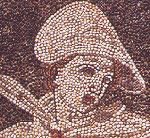The Knight by Gene Wolfe
If I like nothing else about this story — and I'm sure that I will — I absolutely worship the way the hero, who lives in this world, practically falls into a fantasy story as effortlessly as if he were walking into a forest and getting lost, yet those two, short pages in which it so effortlessly happens remain mesmerizing, exciting, unique, and real. Wolfe makes it look so easy.
Starwater Strains: New Science Fiction Stories by Gene Wolfe
Short stories are about all I can take of science fiction right now, and so far, Wolfe's seem much more literary and rich than anything appearing in Analog.
The Wave in the Mind by Ursula Le Guin
I love almost everything that Ursula Le Guin writes, even when I don't agree with her. She makes prose look easy, the way Ulrich Salchow made figure skating look easy. For this reason, it's a joy to choose one essay to read from this collection right before going to bed each night. She eases my brain into pleasant thoughts the way nursery rhymes, read by a loving mom, calm a child's mind.
The topic of the collection, by the way, is just about everything, from writing to writers to public figures to historical events.
Subscribe to:
Post Comments (Atom)



2 comments:
Ah yes, Gene Wolfe. I'm a bit ambivalent about him, though I view him positively on the whole. As you say, his writing's very literary and rich, and when he's on spot he's breath-taking. On the other hand, he does run at times to the over-obscure, and at times his Christianity (he's a believing Catholic, I believe) is too obtrusive--it's not that he writes from a Christian view of the world, but that the Christian symbols stick out too far.
He also has some pet themes that are well worked out but can get repetitive if you read too many of his classic stories at once. For example, many are set in a far future in which humans have long since mastered genetic engineering and the worlds are populated by man's former servants, each group of which has a totem that represents, one gathers, the original species from which they were engineered into intelligence. It's a very fine twist to the usual motif of man becoming like the gods as he learns how to shape living matter, joined with the well-known mythological views associated with totems in traditional societies. (This might be background to "Tracking Song" in The Island of Doctor Death and Other Stories and Other Stories, for example, though there they might rather be degenerations of man after a descent into utter decadence.)
And one story with a thoroughly Christian theme and unobtrusive Christian imagery that works quite well is "La Befana" in IDDOSOS--it's striking that this reviewer so completely missed the point that he found utterly pointless what's really a straightforward, unspectacular, but solid super-short story: "In 'La Befana,' a six-legged alien has a conversation with a family of humans about the baby Jesus, but it all ends before it has really begun, and the reader is left with the sneaking suspicion that Mr. Wolfe only wanted to hang something around a great opening set-up: 'When Zozz, home from the pit, had licked his fur clean, he howled before John Bananas' door.' Great scene. No story." Uh, no, there is a story--a well-constructed one carried by the dialogue, in fact, though very little action.
I'd say stick with the short stories for a while to get a good feel for his work; he has several good collections (the ones I've read are The Island of Doctor Death and Other Stories and Other Stories, Storeys from the Old Hotel, and Innocents Aboard) with stories of all lengths. One story to read for a good example of his slippery, not-always-reliable narrator and for others of his themes would be "Seven American Nights" in IDDOSOS. Another story that succeeds less well (over-obscure Christian imagery) is the novella (I forget the title) collected in The New Atlantis and Other Novellas of Science Fiction (1975), which is especially worth finding because it also contains LeGuin's excellent "The New Atlantis" and James Tiptree/Alice Sheldon's "Houston, Houston, Do You Read?" (Talk about a three-fisted spectacular! Of course, you should read the Tiptree only after the Joanna Russ stories it must have been a response to, "A Few Things I Know About Whileaway" and "When It Changed.") If you do get a taste for his novels, I'd recommend the ones I've read, but so far I've only read Peace, The Fifth Head of Cerberus, and There are Doors. In fact, The Fifth Head of Cerberus is three related novellas that can be very obscure going in places but, I think, worth the effort; it's justly famous for highly literary SF and even has fans in academia. Some day I'll get around to the many volumes of the New Urth, Long Sun, etc. series (they're on my shelf waiting for a few weeks of inanition); I've heard good things about them but can't vouch for them personally.
Excellent! Thanks, Adrian. You have me intrigued, especially about "La Befana". I need to study good dialog, especially when it moves the plot -- which is, of course, the only kind of good dialog.
Given my background, I will have no trouble spotting his Christian imagery, but it won't bother me. I'm into soaking up all the good writing I can get.
Post a Comment